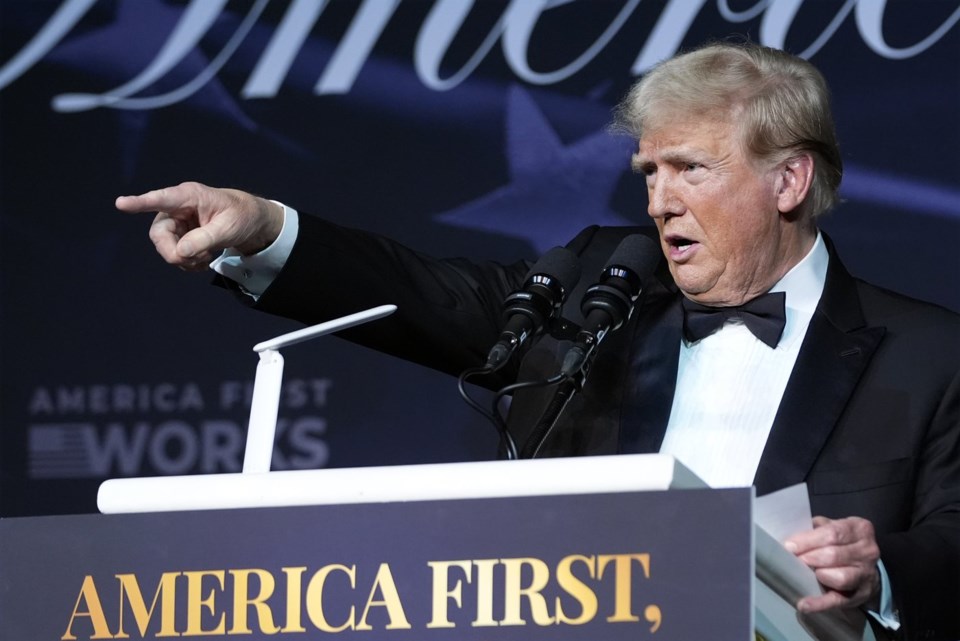TORONTO — Canadian business leaders say Donald Trump's threat to impose a 25 per cent tariff on all Canadian goods would be a "lose-lose" scenario in which local companies face pressure to lower their costs while their American counterparts pay more.
The president-elect posted to Truth Social on Monday that he would sign an executive order imposing a 25 per cent tariff on all products coming in to the United States from Canada and Mexico. He said the tariff would remain in place until both countries stop people and drugs, in particular fentanyl, from illegally crossing the borders.
During the U.S. election campaign, Trump had promised to introduce a universal 10 per cent tariff on all American imports.
Modelling by the Canadian Chamber of Commerce had suggested that would reduce the size of the Canadian economy by around one per cent, resulting in $30 billion per year in economic costs. It estimated the U.S. would see around US$125 billion a year in economic costs.
University of Calgary economist Trevor Tombe, who authored the chamber's report before the U.S. election, said on X that when updating for a 25 per cent tariff, the Canadian economy would take an annual real GDP hit of around 2.6 per cent.
That would equate to around $2,000 per person, he said.
"President-elect Trump’s intention to impose 25 per cent tariffs signals that the U.S.-Canada trade relationship is no longer about mutual benefit. To him, it’s about winners and losers — with Canada on the losing end," said the chamber's president and CEO Candace Laing in a statement.
Laing urged Canada to adapt its approach to trade talks with the U.S., saying that "being America’s 'nice neighbour' won’t get us anywhere."
"We’re facing a significant shift in the relationship between long-standing allies," she said. "Canada’s signature approach needs to evolve: we must be prepared to take a couple of punches if we’re going to stake out our position. It’s time to trade 'sorry' for 'sorry, not sorry.'"
The Canadian manufacturing sector faces one of the largest risks if Trump follows through on his pledge, said Canadian Manufacturers and Exporters president and CEO Dennis Darby. He said almost $2 billion of manufactured goods moved between Canada and U.S. last year and the sector represents around three-quarters of all trade between the neighbouring countries.
"For Canadian companies, they're going to be under intense pressure short term to lower prices, which hurts their margin, which hurts their employees," he said.
Darby added that Canadian businesses could call for retaliatory tariffs, replicating a scenario that played out during Trump's first term in office when his administration imposed a 25 per cent tariff on steel and 10 per cent levy on Canadian aluminum imports.
Canada responded by imposing tariffs of equal value on American steel and aluminum.
Darby said if Trump wants the U.S. economy to grow, his announced plan would achieve the opposite.
"It hurts Canada, obviously, but because we're so integrated, it will increase costs in the U.S.," he said.
"There's no way around it. If your input costs go up because of a tariff, then the finished product costs will go up as well, and so that's why it seems counterintuitive."
Canadian American Business Council CEO Beth Burke said in a statement Monday night that Trump's proposal would harm businesses on both sides of the border and would "erode the economic and geopolitical strength of North America."
Andreas Schotter, a professor of global strategy and general management at the Ivey Business School, said the U.S.-Canada relationship represents one of the world's most integrated economies, with $3.6 billion in daily cross-border trade.
"Nearly nine million U.S. jobs depend on this relationship, spanning manufacturing, agriculture, energy, financial services, transportation, and retail sectors," Schotter said in an email.
"Over 30 U.S. states count Canada as their primary export destination."
He said broad tariffs would particularly harm the automotive sector, with 20 per cent of inputs cross-border sourced, along with the energy, chemical and plastic manufacturing, forestry and machinery sectors.
Schotter's own modelling suggests Canada would need to respond with more aggressive monetary policy intervention, leading to a further decline of the Canadian dollar.
But he remained optimistic that broad tariffs wouldn't materialize and that the threat is instead meant to serve as leverage ahead of the renegotiation of the Canada-United States-Mexico Agreement in 2026.
"Historical precedent suggests final implemented measures tend to be more targeted and limited in scope, but again, who knows what the Trump administration will be up to," he said.
While it's unclear what exact steps Canada would need to take to satisfy Trump and avoid the 25 per cent tariff, CIBC chief economist Avery Shenfeld said he also expects this particular threat "will ultimately go away."
However, he said it could leave "lasting uncertainties over future trade access to the U.S. market," and cause a significant "drag" on capital spending in Canada's export industries.
"Even if this 25 per cent punitive tariff doesn't happen, this won't be the last set of negotiations over trade and tariffs with the new White House team," Shenfeld said in a note.
"Trump's willingness to brandish the tariff weapon so quickly, before even getting to his desk in the Oval Office, portends a long road ahead for both Canada and Mexico to preserve what they negotiated during Trump's first term."
Darby said he was hopeful that conversations with U.S. manufacturing sector leaders could lead to a positive outcome. He acknowledged Trump is more likely to relent if American companies can the sound the alarm over potential harms to the U.S. economy loudly enough.
"History would tell you that that's who they'll listen to the most," he said.
"With the first Trump presidency, we got accustomed to being surprised and it continues."
This report by The Canadian Press was first published Nov. 26, 2024.
Sammy Hudes, The Canadian Press
